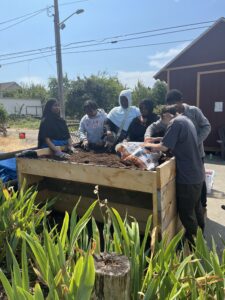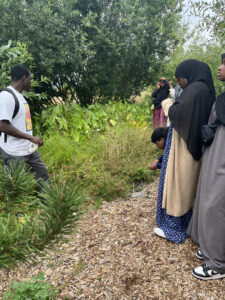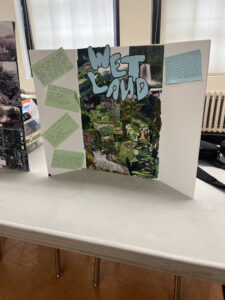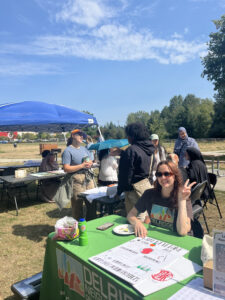2024 Environmental Justice Program Wrap Up
Another summer, another successful environmental justice program!
DNDA’s Environmental Justice Summer Youth Program would like to celebrate the season and our 10 teen interns, along with all the wonderful partner organizations who helped make this program a success!
In 2024, DNDA hosted a five-week internship that stretched from mid-July to mid-August with 10 teens, ages 14-18, and primarily residents of Delridge and High Point. Each day, our program met at Roxhill Park to cover a wide variety of topics related to local environmental issues, understanding the history of the land, and meeting other organizations and community groups who are actively working to build community and improve the health of the local environment.

Our Environmental Justice (EJ) interns work together to fill dirt into DNDA’s Accessible Garden Bed at the Delridge P-Patch. Some work on opening the bag of soil, others are mixing the soil into the bed with gloves and hand tools.
This summer our focus was on FACET – Food, Art, Community, Environment, and Technology. Our interns learned about history past and present of Longfellow Creek, the Duwamish River, and our connection to local environmental justice issues. Some of the environmental justice issues they explored were food access, stormwater pollution, changes to the environment through urbanization and colonization, and accessibility of space.

A group of EJ Interns listen closely as Khalil from the Beacon Food Forest explains the site history, and shares more about the plants chosen for the Urban Garden space.
The interns also connected with ways to monitor, change, and mitigate these challenges. Some examples include looking at green stormwater infrastructure, water quality analysis, and redesigning spaces to meet issues and challenges.
The youth interns participated in a variety of activities: a hike around Roxhill Park where they learned about the history of the peat wetland and connection to history of Longfellow Creek ending with a kayak history tour of the with the River Access Paddle Program through Heron’s Nest. We learned about green stormwater infrastructure by visiting Webster Pond with Seattle Public Utilities, connecting with DNDA’s very own Delridge Wetland Park, and through a site tour with Dirt Corps where we learned about rain gardens and other green designs to mitigate pollution. We also explored food access and sustainability topics while visiting High Point Commons Park with City Fruit, engaging with the Delridge P-Patch and meeting a P-Patch Coordinator, connection to the Beacon Food Forest, and to Marra Farms and Solid Ground and their Community Food Education program. We also worked on skills like planting plans with DNDA Nature staff, using iNaturalist to learn about plant identification and community science, and learn how to build resumes with the High Point Library.

Pictured here an example of one of our EJ intern’s Community Action Project. It is a tri-fold poster board titled ‘Wetland’ with pictures of nature on the center and index cards all over. The intern’s focus was on the importance of wetlands in our local environment, what challenges they face, and how to make sure we can add more into our green spaces in our future!
On Saturday, August 17, our teen interns took what they have learned over time and presented their community action projects (CAPs). These CAPs are a way for the youth to showcase what they learned together over the program. The projects engaged our community members and government agencies about the environmental justice challenges we saw in Roxhill Park and Longfellow Creek, and presented ideas, resources, and information to work towards solving those! CAPs were displayed through poster boards, art projects, hands-on learning or clean-up action, resources and information, free food and recipe ideas, and more! With an audience of family, friends, community members, and DNDA staff, the youth taught us about a variety of topics ranging from the history of Roxhill Park, making Longfellow Creek more accessible, importance of cleaning up pollution, and the impacts of sewage overflow.

A picture of our End of Program Celebration is featured. We see a group of people surrounding different tables and a blue canopy outdoors at Roxhill Park, speaking to each other in the background. A person at the green table with a DNDA t-shirt smiles and holds up a peace sign.
Overall, this summer program was successful in connecting local high school-aged youth to different places and spaces in their community where they learned more about a wide range of environmental justice topics. We want to say a big THANK YOU to everyone who helped make this program possible, including to the program funders at Seattle Parks, Green Seattle Partnerships, and the Rose Foundation. We’re excited to keep growing our Environmental Justice program next year!
-Written by DNDA Environmental Education Coordinator Jules Hepp
